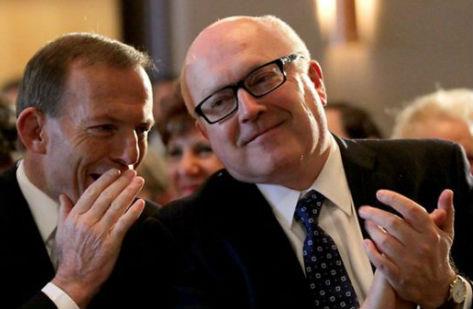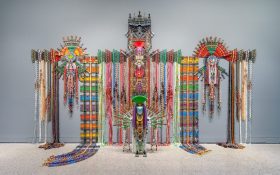A little political history gives us some clues as to what George Brandis might be like as Arts Minister.
Peter Craven’s contention that a ‘Coalition victory could usher in a new creative era‘ , following the Melba Foundation fundraising dinner at Raheen, deserves further attention. Craven may be ‘a feared and respected literary arbiter’ but that does not, ipso facto, make him a good political analyst.
I’ve met Senator George Brandis only a couple of times, in the short time when he was Arts Minister in the Howard government, but I’ve followed his ruminations on the law and the arts in parliament in some detail and read his addresses in Hansards.
Brandis may (or may not) make a good and engaged minister for the arts in the Commonwealth parliament: remember the general approval of Peter Garrett when he was in opposition. Remember too, Garrett’s subsequent capture by the Canberra arts bureaucracy, made dramatically clear by the fiasco over the future of the Australian National Academy of Music.
But knowingly or not, Brandis is pursuing a strategy effectively deployed in 1996 by the Coalition to mobilise opinion leaders in the arts community to the service of the Opposition. According to the former Commonwealth Minister for the Arts, Rod Kemp, the strategy was part of a leave-no-stone-unturned approach to selling Coalition policy for that year’s general election. Nevertheless, it deployed a classical model of political influence, the subject of much study in the USA in the post-war years often referred to as the Erie County study.
In 1996, in terms of arts policy, the Coalition had to recover from the disaster of the 1993 campaign when the affable but ineffectual Senator Michael Baume had carriage of arts policy. His performance was a significant contribution to the loss of what was, from the Opposition’s point of view, the unlosable election.
The 1996 policy was launched at an all-singing, all-dancing spectacular at the old ACCA premises in Melbourne’s Botanic Gardens. State and Commonwealth Coalition members were there including Peter Collins, former Liberal minister for the arts in NSW (1988–1995) and Senator Richard Alston who became Minister for the Arts in the Howard government.
More crucially, the arts cognoscenti from all around Australia were there. A lot of people in key arts creative and management roles had found the time and spent the money to be there. One small IED could have eliminated Australia’s arts and cultural leadership.
A bus-full of national media arrived, John Howard arrived, the music played, the dances danced, the policy was launched: the crowd refreshed itself and talked. .They were not disappointed at first contact: the policy was weighty, detailed, a lot of time and thought had gone into its preparation.
Very soon the word was ‘now the Opposition has a credible arts policy we can take them seriously, as an Opposition, and consider what benefits they may deliver to us in government’. In just a few hours, the Opposition’s lack of credibility in terms of arts policy had shifted.
Was that shift part of the election victory that followed? Perhaps yes.
The Coalition had gathered several hundred opinion leaders in the arts and convinced them to take the policy and the Opposition seriously. The Erie County study from the late 1940s dramatically illustrated the role of opinion leaders in shaping the opinions of those less engaged in the political process, so perhaps several hundred arts lovies did delivered victory to Howard.
Senator Brandis is about the same journey. The Melba Foundation, in whose honour the dinner at Raheen, Jeanne Pratt’s mansion, was held, is not short of heavies with access to the media and, hence, the voters.
Among them is the Melba Foundation chairman, former Liberal minister for the arts Richard Alston. And the Foundation counts among its friends the Governor-General Quentin Bryce, film-maker Baz Luhrmann and former President of the World Bank, James Wolfensohn. When these guys talk, others listen.
Brandis’ message would have been closely tailored to his audience’s anatomy. I’m sure the virtues of peer review, the process that stripped the Melba Foundation of its lavish government support but a process that Brandis is on record as supporting, rated any word of praise.
And listening and dining and being impressed, was Peter Craven. Perhaps a little more insight and a little less adulation, Peter Craven, after all there are no free dinners, especially at Raheen.





